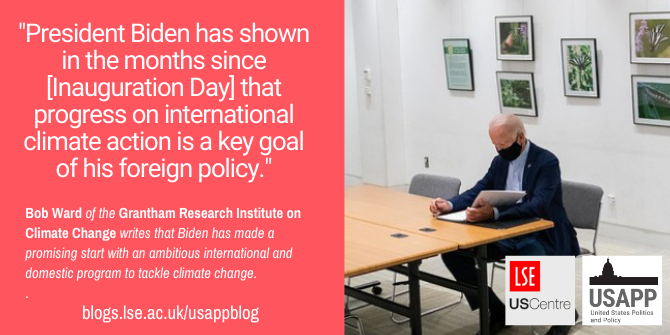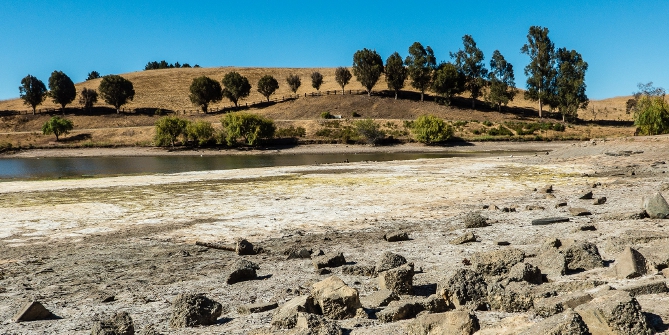 When he entered the White House in January, President Joe Biden inherited a country which had abandoned many of its international commitments on tackling climate change under President Trump. As part of our new Building Back Better series, Bob Ward looks at how the new Biden administration has already sought to reengage with the world on climate action and begun work on domestic policies focused on emissions reductions.
When he entered the White House in January, President Joe Biden inherited a country which had abandoned many of its international commitments on tackling climate change under President Trump. As part of our new Building Back Better series, Bob Ward looks at how the new Biden administration has already sought to reengage with the world on climate action and begun work on domestic policies focused on emissions reductions.
The President began his term in office by keeping a campaign pledge to re-join the Paris Agreement, initiating the process on Inauguration Day. The United States officially became a Party to the Agreement one month later, on 19 February 2021. This reversed the November 2020 withdrawal from the Agreement by President Trump, who had made demonstrably false claims about its impact on the economy of the United States.
President Biden has shown in the months since then that progress on international climate action is a key goal of his foreign policy. The issue was raised in many of his first conversations with world leaders, and he has appointed former Secretary of State, John Kerry, as Special Presidential Envoy for Climate, and a member of the National Security Council.
Working with the world
The Biden Administration has apparently recognised the potential for climate change around the world to create higher risks of political instability and conflict. In February, President Biden signed an ‘Executive Order on Rebuilding and Enhancing Programs to Resettle Refugees and Planning for the Impact of Climate Change on Migration’. This mandated a report within six months on climate change and its impact on migration, including forced migration, internal displacement, and planned relocation, as well as the “international security implications”.
Secretary Kerry has acknowledged that a crucial part of his role is to engage China about its efforts on climate change. The relationship between the world’s two largest emitters of greenhouse gases will be a critical determinant of international progress on climate change over the next few years but could be hampered by disputes across a range of other issues. China has appointed the highly-respected Xie Zhenhua as special climate envoy.
A high-level meeting between the two governments in Alaska earlier this month ended with China’s media claiming that the two governments had agreed to form a joint working group on climate change.
President Biden has invited 40 world leaders, including President Xi Jinping, to a summit on climate change to take place on 22 and 23 April 2021. He has also promised to re-convene the Major Economies Forum on Energy and Climate Change, which President Trump had discontinued.
Committing to more ambitious emissions reductions
The Biden Administration has indicated that it will also submit its revised ‘nationally determined contribution’ (NDC) to the Paris Agreement ahead of the leaders summit. All Parties to the Agreement are expected to make more ambitious pledges for cuts in emissions before the 26th session of the Conference of the Parties (COP26) to the United Nations Framework Convention on Climate Change, which is due to take place in Glasgow, Scotland, between 1 and 12 November 2021.
The first NDC, which was produced by the Obama Administration ahead of the COP21 United Nations climate change summit in Paris in December 2015, included a pledge to “achieve an economy-wide target of reducing its greenhouse gas emissions by 26–28 percent below its 2005 level in 2025 and to make best efforts to reduce its emissions by 28%”.
President Biden is under pressure to commit to a much more ambitious reduction in emissions of 50 percent by 2030 compared with 2005.
The latest figures show that total annual emissions of greenhouse gases by the United States were 9.7 percent lower in 2018 compared with 2005. Recent analysis by the United States Energy Information Administration suggests that annual energy-related emissions of carbon dioxide were 10.9 percent lower in 2020 compared with 2019, but are expected to climb by 8.0 percent by 2022.
Nevertheless, President Biden has laid out his ambition for “a clean energy revolution that achieves a carbon pollution-free power sector by 2035 and puts the United States on an irreversible path to a net-zero economy by 2050”.

“Remarks on the Climate Crisis – Wilmington, DE – September 14, 2020” by Joe Biden is licensed under CC BY NC SA 2.0
The domestic agenda and climate action
But it is not yet clear to what extent the Administration’s plans for economic rescue and recovery from the COVID-19 pandemic advances domestic action on climate change. The American Rescue Act, which the President signed into law earlier this month, includes relatively little in the way of explicit investments in climate-related actions within its US$1.9 trillion budget.
However, there are many signs that work is under way within the Biden Administration to advance the President’s domestic agenda on climate action. Gina McCarthy, the former head of the Environmental Protection Agency, has been appointed as National Climate Adviser to the President and is leading a National Climate Task Force, including members of the Cabinet and other senior members of the Administration.
The return of the social cost of carbon and the re-centering of expertise
The Administration has already acted swiftly to remove an important technical impediment to climate change policies. It has reinstated values of the social cost of carbon which were introduced by the Obama Administration but had been replaced by the Trump Administration with figures that were widely condemned by experts.
The social cost of carbon is used in cost benefit analyses of potential policies. The value calculated by the Obama Administration for the social cost of carbon in 2030 was US$60 (in 2018 dollars), with a discount rate of 3 percent. The Trump Administration reduced it to US$8 by excluding any consideration of the impacts of carbon dioxide outside the United States, hence making ambitious policies to reduce emissions appear uneconomic.
The Biden Administration has also moved to prevent the political interference in the provision of scientific advice about climate change which was endemic within the Trump Administration, and has allowed the Environmental Protection Agency to restore information to its website.
It is a promising start, but much still needs to be done before the United States can credibly claim to have reclaimed its leadership on climate change under President Biden.
- This article is part of our Building Back Better series, which looks at how the Biden Administration is tackling issues across US governance, economics, politics, culture, and society. Read more articles in this series.
Please read our comments policy before commenting
Note: This article gives the views of the author, and not the position of USAPP– American Politics and Policy, nor of the London School of Economics.
Shortened URL for this post: https://bit.ly/2NWqGot
About the author
 Bob Ward – Grantham Research Institute on Climate Change
Bob Ward – Grantham Research Institute on Climate Change
Bob Ward is policy and communications director at the Grantham Research Institute on Climate Change and the Environment and the ESRC Centre for Climate Change Economics and Policy at the London School of Economics and Political Science.






